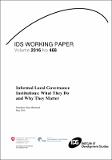| dc.contributor.author | Khan Mohmand, Shandana | |
| dc.date.accessioned | 2016-05-09T12:56:08Z | |
| dc.date.available | 2016-05-09T12:56:08Z | |
| dc.date.issued | 2016-05-09 | |
| dc.identifier.uri | https://opendocs.ids.ac.uk/opendocs/handle/20.500.12413/11587 | |
| dc.description.abstract | There is growing scholarly and policy awareness of the fact that public authority is rarely exercised only by the state. In fact, a host of actors and institutions – some visible and recognised, others invisible and less obvious – exercise authority over and regulate the everyday life of local populations across large parts of the world, with important implications for public policy. While we recognise more and more that such actors and institutions take on various governance-related functions within local communities, our understanding of the role that they play is fairly limited and, possibly because of this, our discomfort with them is often fairly high. This paper represents an effort to deal with this gap. It is led by a central puzzle – as the incidence of electoral democracy has increased across the world, we would expect to see an accompanying formalisation of governance through the consolidation of public authority within institutions of the state. This has not happened. Instead, we find that the role and importance of informal local institutions that take on governance functions has increased and that they are a central component of ‘multicentric’ governance in large parts of the world. Why is this so and how do these informal institutions sustain and perpetuate the local public authority that they exercise across multiple domains? I provide a number of explanations for the persistence of such institutions in large parts of South Asia, Africa and the Western Balkans. Our interest in these informal local institutions is practical and policy-oriented, and I use empirical evidence from a decade of primary research in South Asia and the Western Balkans to draw a boundary around a set of institutions that we call informal local governance institutions (ILGIs). | en |
| dc.language.iso | en | en |
| dc.publisher | Institute of Development Studies | en |
| dc.relation.ispartofseries | IDS Working Paper;468 | |
| dc.rights | This publication is copyright, but may be reproduced by any method without fee for teaching or nonprofit purposes, but not for resale. Formal permission is required for all such uses, but normally will be granted immediately. For copying in any other circumstances, or for re-use in other publications, or for translation or adaptation, prior written permission must be obtained from the publisher and a fee may be payable. | en |
| dc.rights.uri | http://www.ids.ac.uk/files/dmfile/IDSOpenDocsStandardTermsOfUse.pdf | en |
| dc.subject | Governance | en |
| dc.title | Informal Local Governance Institutions: What They Do and Why They Matter | en |
| dc.type | IDS Working Paper | en |
| dc.rights.holder | Institute of Development Studies | en |
| dc.identifier.team | Governance | en |

